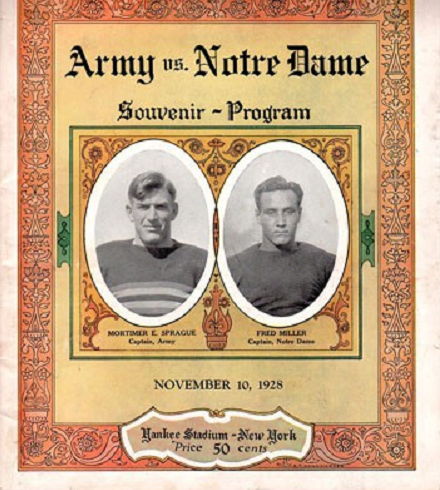The Post-Journal
by Randy Anderson
December 5, 2016
‘Win One For The Gipper’ Takes On Local Significance

It’s Sunday about 9 a.m. I’m seated at the kitchen table, still wearing pajamas and a robe, drinking a cup of coffee and reading (Post-Journal sports editor Scott Kindberg’s) article about Gene Mahoney, the 1926 JHS alum who played for Knute Rockne at Notre Dame. The doorbell interrupts. Standing on the porch is Chautauqua Sports Hall of Fame inductee and pre-eminent local sports historian Greg Peterson. He hands me a package and says, “Here, look it up.” He departs as quickly as he arrived, apparently onto the next mission for the man who seemingly never rests.Inside the wrapper was a pristine copy of the Notre Dame vs. Army football game of Nov. 10, 1928, played at Yankee Stadium. Inside, listed on the Notre Dame roster is No. 6, Gene Mahoney, 189-pound tackle from Jamestown High. This came as a bit of a surprise to me since the official Notre Dame football website identifies Mahoney as a player on only the 1927 team. Has Peterson uncovered a fact not known to Notre Dame historians?
Remembering Greg’s parting words to “look it up,” I opened my laptop and Googled the game. I learned the two-loss Fighting Irish had played the undefeated Cadets in front of a sold-out throng at the House that Ruth Built in one of the most famous games in the grand history of ND football.
Following is an online description of that game:
Meanwhile, the New York Times reported the game thusly:
The referee’s whistle blew taps for the Army today. Under the pent-up power of Knute Rockne’s nomads from Notre Dame the unbeaten eleven from West Point was buried in its first defeat of the season when the thrill of the whistle sounded the end of the game at the Yankee Stadium.Through the gathering dusk, into which 85,000 pairs of eyes were peering, the end came with Army on the Notre Dame 1-yard line and Notre Dame a touchdown to the good, gained in the last quarter on a 32-yard pass from Johnny Niemiec to Johnny O’Brien.
The score was 12 to 6. Johnny O’Brien made only one play during the game, but that one meant triumph for the South Bend cyclone and the shattered record of an Army eleven that fought desperately, determinedly, but in vain, until the final whistle sounded taps over their beaten bodies.
For three periods, Johnny O’Brien sat on the sidelines, huddled under his blanket with a hope in his heart that he might be called on to do something for Notre Dame. And if he was called on, he would make good. Johnny O’Brien was still on the bench through most of the final quarter. The score was 6-6, minutes were ticking away and he hadn’t been called on. Notre Dame was marching down the field with steady strides. Notre Dame was apparently headed for another touchdown. Then two things happened. First a bad pass from the centre cost Notre Dame sixteen yards and there was a sudden command from Knute Rockne.
Obeying that command, Johnny O’Brien flung his blanket aside and dashed on to the field, reporting to the referee. O’Brien barked a string of numbers and as the ball was snapped back to Niemiec he winged his way down the field. The goal line was 32 yards away when he started in full flight, but on he went until it was within stepping distance. Then he turned. Timing O’Brien’s speed exactly, Niemiec took his time in handling the ball and then he flung it through the air. When Johnny O’Brien turned his head he saw the ball floating down from above. He reached his arms upward and grasped it and then he fell. But he fell over the goal line.
That one play was all that Johnny O’Brien made. He didn’t even wait for Niemiec to attempt the extra point, which failed to gain. Johnny was through. He dashed for the side lines, his work done, and done well. He had scored the touchdown that brought victory to Notre Dame and defeat to the Army.

Are you kidding me? Did Greg Peterson just show that Jamestown’s Gene Mahoney could have been in the locker room when Rockne gave perhaps the most famous speech in college football history?
— — —
Randy Anderson is the president of the Chautauqua Sports Hall of Fame and a Lakewood resident. Greg Peterson, also a Lakewood resident, is a 2012 CSHOF inductee.
The additional financial assistance of the community is critical to the success of the Chautauqua Sports Hall of Fame.
We gratefully acknowledge these individuals and organizations for their generous support.











